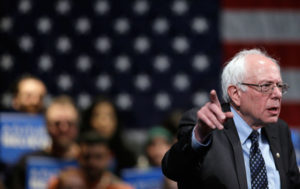As French Election Nears, a Bernie Sanders-Style Candidate Rises in the Polls
The threat of proto-fascist Marine Le Pen continuing the trend started by Brexit and Donald Trump’s victory is tempered by the possibility that a socialist—Jean-Luc Melenchon -- could prevail. The threat of proto-fascist Marine Le Pen continuing the trend started by Brexit and Donald Trump’s victory is tempered by the possibility that a socialist—Jean-Luc Melenchon—could prevail. Shades of Sanders: French presidential candidate and socialist Jean-Luc Melenchon draws a crowd at a rally in Rennes, France, on March 26. (David Vincent / AP)
1
2
3
4
Shades of Sanders: French presidential candidate and socialist Jean-Luc Melenchon draws a crowd at a rally in Rennes, France, on March 26. (David Vincent / AP)
1
2
3
4
Benoit Hamon and Jean-Luc Melenchon are both sharp fellows. Certainly they can seize the moment, combine forces and not miss an opportunity to change the world for the better.
Hey, guys, I’ll make it really simple. Listen up, here’s the plan: One of you, let’s say Melenchon because he has the momentum, continues to stand for president, and the other (Hamon) will throw his support behind Melenchon for the presidency. In exchange, Hamon will lead a left coalition of candidates in the upcoming parliamentary election and be promised the prime ministership if Melenchon wins the presidency and the left coalition either wins the parliamentary election or Hamon is able to cobble together a majority coalition.
Seems fair and simple, right? Apparently, there’s no chance it will happen.
Oh, well, it’s really not surprising — we’re talking about career leftists. Solidarity is a slogan, rarely a reality. It’s not as if the welfare of the entire French working class, which will be flattened by Macron’s planned labor market reforms, is as important as the performance of a neoliberal political party that deserves to be thrashed after selling out its base these past few years.
Of course, even in a rapidly reconfiguring political landscape, this clearly logical solution will almost certainly not come to pass. Thus, neither will a runoff between Melenchon and Macron, or Melenchon and Le Pen, transpire. Both of those delicious matchups will be exiled to the realm of fantasy.
But since April 23 has not yet passed, it is worth pointing out that Melenchon’s prospects against either the neoliberal or the proto-fascist would be decent and very good, respectively. On the one hand, Le Pen’s supporters are no longer classical European conservatives but are drawn significantly from the working class. In fact, Le Pen’s domestic social contract resembles Melenchon’s more than Macron’s — with the caveat that the benefits of the welfare state in Le Pen’s France are weighted toward “the real French,” whereas Melenchon’s offers are for all who live in the republic.
So Melenchon could expect to win a sizable enough portion of Le Pen’s supporters to be competitive with Macron in a runoff, and for the same reason — i.e., because Le Pen’s economic policies are no longer classically right-wing — Melenchon would probably win handily against Le Pen because many of the conservative Macron and Fillon supporters would have lost their primary rationale for supporting the National Front.
And if Melenchon were to win and the left gain a majority in Parliament (allow me to dream here for a moment), they could really get things done immediately. This would stand in contrast to the scenario of a Bernie Sanders victory in 2016, when he would have been severely constrained by right-wing control of the House and the dearth of left Democrats in Congress.
Just as significantly, progressive public institutions in France have not been systematically underfunded as in the U.S., and the French public has much more faith in them. The American right wing’s sustained offensive against the public sector over the past four decades would have posed a unique challenge to a Sanders presidency. As with Sanders, the expansion and strengthening of the public sector is central to Melenchon’s program; in contrast to the American landscape, he would be in an almost ideal environment to achieve these ends.
However, there’s one highly significant hindrance: the eurozone rule against deficit spending past 3 percent of GDP. This, of course, severely restricts the classical Keynesian strategy of using deficit spending to promote growth during economic downturns and thus effectively requires austerity at the very time when it does the most harm (during a recession).
This rule has been enforced unrelentingly in recent years, in particular by Angela Merkel’s Germany, imposing misery on Greece and much of southern Europe and effectively allowing for the consolidation of social and political power by the continent’s dominant financial institutions in coordination with centrist politicians. Public resentment of this arrangement is profound across the continent outside of Germany.
And this might constitute the most important part of Melenchon’s program, as he promises that he would do whatever is necessary to break the restriction on the national European governments’ ability to use deficit spending to stabilize their economies, generate growth and redistribute wealth. Melenchon, who is no shrinking violet, has promised to challenge and defeat German influence on the eurozone if necessary to allow for progressive fiscal policy.
If a President Melenchon were to succeed in changing this rule, he would effectively end the era of neoliberalism on the European continent. Greece wanted to go there a few years ago, but it was too small a country and had no strong allies in the governments of the major countries. For his part, Melenchon would have tremendous leverage to win this battle, as it is inconceivable that the European project would go forward without France — and he has made it very clear that if this rule is not changed, with greater deficit spending returned as an option, he will call for a vote on “Frexit.”
With a new French president supported by tens of millions of people around Europe in such a showdown, it seems almost certain the Germans would blink first. So, while France is not itself the controller of its own sovereign currency like the United States, a Melenchon victory followed by a left triumph in the parliamentary elections would signal the beginning of a new, more equitable economic era. The other presidential options are an elite banker or a proto-fascist.
Your support matters…
SUPPORT TRUTHDIG
Independent journalism is under threat and overshadowed by heavily funded mainstream media.
You can help level the playing field. Become a member.
Your tax-deductible contribution keeps us digging beneath the headlines to give you thought-provoking, investigative reporting and analysis that unearths what's really happening- without compromise.
Give today to support our courageous, independent journalists.






You need to be a supporter to comment.
There are currently no responses to this article.
Be the first to respond.